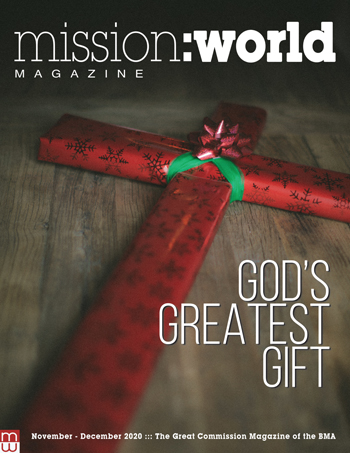God’s Greatest Gift
BY: Dr. John David Smith
Executive Director
BMA Missions

edition of mission:world!
The custom of giving gifts to celebrate the birth of Christ is probably traced back to the fourth century. It is indeed most likely based on a non-Christian custom from the Roman Empire. However, it is possible to contextualize most things and make them Christ-centered, positive customs as followers of Christ have done with gift giving. When we think about gift giving at this time of year, our thoughts may migrate to the memories of being dressed in our fathers’ way-too-big house robes, our heads covered with a bath towel, some makeshift staff in our hands, and a gold, spray-painted box and/or trinket representing gold, frankincense, and myrrh during the annual Christmas play as we portrayed one of the three (by the way the Bible does not say there were three) “wise men” with their gifts for baby Jesus. Unfortunately, in our heavily consumeristic cultures, we may think of that latest and greatest gadget that I want for Christmas this year. We will look a little deeper in this article at gifts, specifically the gifts of the magi (wise men) and God’s greatest gift.
For fun, consider some of the gift giving customs around the world that differ greatly from our own customs in that area. In Kenya, the Massai people insist on spitting on your gift as a blessing. They also spit on the head of a newborn baby for the same effect. In Brazil, never wrap your gift in purple wrapping paper because purple is the sign of mourning. Many Australians celebrate Christmas on July 25 and December 25 because in December they are in the middle of the hottest part of summer. They like to celebrate at a time when the temperatures more closely reflect Christmas to them. In the U.S. that does not seem strange at all especially to the Hallmark Channel addicts who know they watch Christmas movies in July (all comments about the Hallmark Channel should be addressed to Larry Barker).
A gift is defined as something received or given without compensation in return. In the Old Testament, gifts could be sacrifices to God; health, food, and wealth from God; gifts on festive occasions (Ps. 45:12; Esther 9:22)…so we do have precedence for our giving gifts on special occasions; a dowry for a bride; and even used negatively to gain undue favor or a bribe.
In the New Testament the idea of a gift changes considerably to place emphasis more on what God does for us that no one else can do. “Every good gift and every perfect gift is from above, and comes down from the Father of lights, with whom there is no variation or shadow of turning” (James 1:17).
Taking a closer look at the gifts presented by the Magi to the baby Messiah can also shed more light on this idea of gift giving from a Middle Eastern viewpoint. Author Tony Maalouf (1957-2020), a Syrian-born brother who came to Christ in the midst of medical studies and changed course to become a professor of Middle Eastern studies at a number of reputable seminaries, speaks about these gifts in one of his books. The main focus of his book is to show that these Magi were from Arabia and not Chaldea or Persia.
To read the rest of this article click on the image above.
